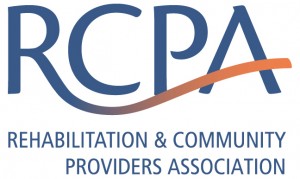A group of medical students at the University of Pittsburgh, along with physicians, autism advocacy staff, and medical students across the country created the attached COVID19 resource and symptom guide for individuals on the autism spectrum and/or with ID. We are working on sharing it with any and all community groups. The guide was created to distill the CDC guidelines to a reading level and to be visually informative and accessible to all individuals. We hope this guide can be of use to your staff, clients, and families. Additionally, these are available in a Spanish version.
Carol Ferenz
ODP Clarification for Small Group Employment Services Providing “Essential Services”
A Message to DSPs from Secretary Teresa Miller
Pennsylvania Secretary of Human Services, Teresa Miller, would like to thank all direct support professionals for their dedication during the COVID-19 outbreak.
Watch the personal address here
ANCOR Looking for Stories to Highlight COVID-19 Impact on Providers, DSPs and the People Served
From ANCOR:
The deeper we get into the COVID-19 pandemic, the more we see evidence that lawmakers and the press need to hear stories about the impact of the coronavirus on provider organizations, direct support professionals and the people who leverage community-based disability supports.
Do you know an outstanding DSP who has gone above and beyond to ensure the health and well-being of someone they support? Has your organization adopted innovative solutions to the crisis despite a seemingly endless series of constraints? Are the people you support making an impact in your community by volunteering their time? We need to hear about these stories, as they can help fuel our outreach to the press, our advocacy on Capitol Hill and more.
If any of the above (or the additional ideas below) describe you or someone you work with AND you’re willing to let us share your story, please shoot me an email with a 1-2 sentence summary of the story. Based on your response, we’ll follow up with you to fill in whatever blanks we need, and we will only share stories in our outreach to lawmakers and the press with your permission.
Additional Ideas for Stories Worth Sharing
Do you know a DSP who is:
- Rising to the occasion in creative or innovative ways?
- Sharing their hobbies or talents (e.g., baking, singing, etc.) to help the people they support cope with the fear, anxiety and isolation spurred by the pandemic?
- Having to engineer safety protocols in a particularly hard-hit community?
- Willing to create/contribute to a “day in the life” video to show what it’s like to support people in their homes during the crisis?
Is your organization:
- Adapting your work in unique ways in light of the need for self-quarantine in group homes, ICFs, etc.?
- Coming up with creative solutions to the workforce shortage that has been compounded by COVID-19?
- Seeing evidence that COVID-19 is disproportionately affecting certain members of your direct support workforce (e.g., workers of color, workers with disabilities, etc.)?
Does your organization support someone with I/DD who is:
- Contributing to their community in impressive ways (e.g., volunteering to make masks, send care packages to nursing homes, etc.)?
- Being hospitalized (or hospitalized for longer than otherwise needed) because they can’t transition home?
- Experiencing the COVID-19 pandemic differently from others in the community because of their specific disability?
- Considered an essential worker and thus still working? If so, what are they doing to keep themselves and those around them safe?
Please contact Sean Luechtefeld with any information you would like to share, and please copy Carol Ferenz, so we may contact media in PA as well:
Sean Luechtefeld
Communications Director
ANCOR
703.535.7850 x100
National Alliance for Direct Support Professionals Resources
IDD Members Action Needed: Contact Your Legislators
RCPA has been actively advocating for financial assistance for IDD providers to be implemented as promised by ODP. As of today, April 22, 2020, rate changes have not been made. As a result, we have sent the following email to legislators in PA. We urge you to contact your legislator to encourage them to take immediate action!!
COVID-19 Crisis in Funding: The Immediate Need for Enhanced IDD Rates
April 22, 2020
The COVID-19 crisis has hit multiple areas of the Commonwealth’s Health and Human Services system. Rightly so, the emphasis has been on the availability and safety of medical and emergency medical care. Availability of protective equipment, testing, and treatment interventions (e.g., ventilators) have been the primary focus.
There is a population, however, that is at extreme risk through this period – those with intellectual and developmental disabilities (IDD) residing in community residences (i.e., group homes). These individuals require 24/7 services from a dedicated workforce (direct service professionals, or DSPs) and the consumers themselves often have behavioral and/or medical complications that make their support that much more difficult during this period.
The low pay available for these DSPs has been well documented and much discussed at the PA legislature through past budget cycles. In this time of crisis, this pay disparity is heightened. We need these professionals more than ever to continue to perform this important work with an extremely vulnerable population. Simply put, every day the DSPs come to work understanding that they could be exposed to the virus and take this back with them to their family and loved ones.
Early in the process the Office of Developmental Programs (ODP) promised IDD providers a rate “enhancement” to recognize the critical and difficult work of the DSPs. Through many meetings ODP noted that assumptions were being reviewed and new rates were pending. Several agencies, desperate to keep the workforce in place, even jumped out and began offering staff increased pay, often referred to as “battle” or “hero” pay.
Now we learn that the promise of enhanced rates has been removed from the table. The exact “behind the scenes” driver of this decision is unclear, other than it is being held at “the governor’s office” or “the budget office.” The fact that it has disappeared, however, cripples the situation.
It must also be remembered that all these IDD programs are 100% funded by the Commonwealth. There is no cost-shifting or cost-offset ability. Unless additional funding comes from ODP or another Commonwealth resource, there is no money available.
IDD providers are faced with some very difficult and real decisions. How do they continue to incentivize this workforce in the face of such difficult and perilous work? If they unilaterally offer staff increased pay (with no corresponding department increase), how do they keep these residences solvent? How do they cover increased overtime expenses (with community and day programs closed), training, PPE, etc.?
As a community we then need to ask: if these programs go away – what then? Who will support these individuals in need, and where?
We are asking the legislature to immediately and effectively address this issue. The clock is ticking, and decisions need to be made. We ask the legislature to push the administration to fulfill the promise and offer enhanced rates to IDD providers such that they can address this workforce need in a time of crisis.
Finally, this need not be in the form of an overall budget increase. There are several places where these funds can come from. The existing Community Participation Supports (CPS) programs have been largely eliminated during this “community shutdown” and ODP would have a realized savings. Further, funds have come to PA via the increased federal match (FMAP) and federal stimulus funds (“CARES” Act) that were earmarked specifically for such program funding. Yet nothing has happened.
IDD providers were promised this needed funding and acted in good faith, thereby doing whatever they could to keep services going and consumers and staff safe.
We thank you for your swift action in this area. We would be glad to discuss this further and to answer any questions. Thank you.
Jack Phillips, JD
Director, Government Affairs
CMS Announces COVID-19 Emergency Declaration Blanket Waivers for ICF/IID Providers
College of Employment Services Announces Temporary Changes to ACRE Fieldwork Assignments
ODP Announcement 20-048 shares updated information regarding fieldwork assignment changes for the ACRE course through the College of Employment Services (CES).
Due to the COVID-19 pandemic, CES has received temporary approval for fieldwork assignments that usually require contact with employers and job seekers to be revised. Now learners will use the internet, phones, video conferencing, and other media in lieu of face-to-face meetings and contact. Learners do not need to have any contact with employers but will still need to have remote access to a job seeker to complete some of the assignments.
These temporary directions for fieldwork assignments are posted on the courses and will expire on September 30, 2020.
Questions about specific circumstances to which this change applies can be directed to the Institute for Community Inclusion (ICI), attention: Lara Enein-Donovan.
General questions about this communication can be directed to this email.
IDD Residential Providers Share Incentives offered to DSPs During COVID-19
Disability Rights of PA Seeking Public Comment
Monday, April 20, 2020, Disability Rights of Pennsylvania (DRP) started its 45-day public comment period for fiscal year 2021 annual program goals and objectives. DRP invites public feedback on the issues that matter most to individuals with disabilities, along with their families and organizations supporting them. June 4, 2020, will be the final day to offer public comments. DRP is hosting one live webinar (details TBD) to accept public comment. Keep up to date on our page and social media for more information on how to participate.
Specifically, DRP would like to hear your ideas about the impact of COVID-19, any associated advocacy that should be facilitated because of the virus, as well as current, new, and emerging issues since last year’s comment period:
- How we can ensure the protection of civil and human rights
- The training opportunities we should make available for people with disabilities, family members, and for people who provide supports and the general community.
DRP is the federally authorized protection and advocacy system in Pennsylvania to provide legal and advocacy services to persons with disabilities.
DRP staff works diligently statewide to:
- Improve disability service and social systems
- Work to ensure civil rights and to empower the community
- Provide technical and training assistance
We welcome your participation in this process and thank you for your time and input. Let’s continue this advocacy together.
– Thank you, from all of us at Disability Rights Pennsylvania

















